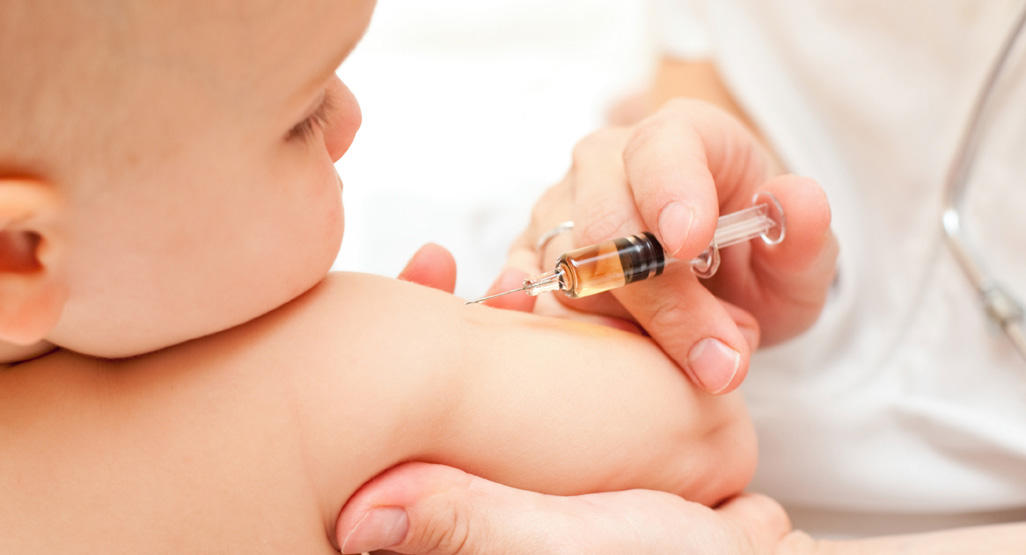In this article
- How will I know when my baby's immunizations are due?
- What will happen before the immunizations?
- Who will be giving the immunizations?
- How are the immunizations given?
- How can I lessen the pain of vaccinations for my baby?
- What will happen after my baby's been immunized?
- What are the side effects of immunizations?
- Can I give pain relief medicine to my baby after the immunization?
- When should I be worried about my baby’s symptoms after vaccinations?
How will I know when my baby's immunizations are due?
When you take your baby to your family doctor, pediatrician or a public health nurse for the first time, usually two or three days after his birth, you will receive information on immunizations. They will start a chart for your baby and will give you a booklet that contains the immunization schedule of your province or territory. You may receive the same chart from the hospital when you check out after delivery, or from a public health nurse or midwife.Vaccine schedules are slightly different depending on which province or territory you live in. Generally, your child will receive vaccinations at the following ages:
- between birth and two months
- at four months
- between 12 to 18 months
- four to six years
(Govt of Canada 2018a)
Ask the doctor or nurse to complete your baby’s vaccination record every time he gets immunized. It’s important to keep this record up to date, especially if you move to another province or territory that has a different vaccination schedule.
You can also use a free smartphone app from CANImmunize. It stores your baby’s immunization records and helps you get your baby vaccinated on time (Caring For Kids 2016a).
What will happen before the immunizations?
Before your baby’s first set of immunizations, your doctor will usually give him a brief checkup, and ask a few questions about any allergies or health issues. Your baby’s immunizations may be delayed by a few days if he has a fever or is very unwell (Govt of Canada 2018a). He can have the injection when he is better.Read our article on what to do if your baby is sick when an immunization is scheduled.
Who will be giving the immunizations?
Immunizations are usually given by your family doctor, pediatrician or public health nurse. She will probably ask you to sit with your baby held closely on your lap while she gives him the injection.Some parents find it a bit upsetting, but it’s all over very quickly. If you don't want to be in the room while your baby is having his injection, you could ask your partner or another relative to go instead.
How are the immunizations given?
Most of your baby's immunizations will be given by injection into the top of his thigh. If he’s older than 12 months, he will probably have the injection into his arm. Some immunizations are given by mouth or sprayed into the nose (Govt of Canada 2018a).Some vaccines, such as the meningococcal and pneumococcal vaccines, are given as a single-dose injection. Others are given via an injection that contains more than one vaccine (Govt of Canada 2018a).
So, for example, in some parts of Canada, diphtheria, whooping cough (pertussis), tetanus, polio and Hib are given in one injection (often called the 5-in-1 vaccine) rather than five separate ones. In other parts of the country, the 6-in-1 vaccine also contains the hepatitis B vaccine (Caring for Kids 2016a).
How can I lessen the pain of vaccinations for my baby?
Here are some tips to help reduce the pain:- If you breastfeed, nurse your baby right before, during and after the injection. Otherwise, you could give your baby a pacifier or sugar water (using a dropper) right before the injection (Caring for Kids nd, CANImmunize 2019).
- Although there isn’t a lot of research to show that sugar water lessens the pain of injections (Kassab et al 2012, Taddio et al 2017), some parents and healthcare practitioners swear by it (Caring for Kids nd, CANImmunize 2019). To prepare sugar water, mix 5ml (one teaspoon) of white sugar with 10ml (two teaspoons) of distilled or boiled water. If your baby is over six months, you can use tap water if it’s safe to drink (CANImmunize 2019).
- Hold or hug your baby in your lap during the injection. Be careful you don’t hold him too tight as it might increase his distress. Gentle rocking after the injection can be soothing too (CANImmunize 2019).
- Distract your baby with a toy, rattle, book or song (CANImmunize 2019, Caring for Kids nd).
- Try to stay calm, be positive and use your normal speaking voice. If you’re anxious, take some slow, deep breaths to relax yourself (CANImmunize 2019).
- Apply an anesthetic cream, gel or patch to your baby’s skin before the injection (usually 30 minutes to an hour). These products will numb the skin where the needle goes in, but you’ll need to ask your healthcare provider in advance where to put it. Anesthetic creams can be bought without a prescription at your local pharmacy, and are safe for newborns and babies.
(Taddio et al 2015, Caring for Kids nd, Govt of Canada 2018b, CANImmunize 2019) Ask your healthcare provider where to put the cream, or see this guidance from HealthLinkBC.
The Canadian Paediatric Association recommends that you don’t give any pain relief medicine, acetaminophen or ibuprofen, to your baby right before the vaccination. This is because it could interfere with how well the vaccine works (Caring for Kids 2016a).
What will happen after my baby's been immunized?
You will be asked to stay in the clinic or doctor’s office for about 15 to 20 minutes after the immunization. That's because, like any medicine, there is a very small chance of an allergic reaction to the injection.Your baby may be upset for a little while and may be irritable that evening. Some parents find their babies need more soothing at night, after an immunization. So it may be worth clearing your schedule after your baby’s appointment, so that you can give him some extra cuddles and attention.
What are the side effects of immunizations?
Common side effects include mild pain, redness and swelling at the place where the needle goes into the skin. These side effects are usually nothing to worry about and will go away within a day or two (Govt of Canada 2018b).Some children also develop a mild fever afterwards. Giving your baby acetaminophen or ibuprofen for fever may help him feel more comfortable (Caring for Kids 2016a).
Although rare, febrile seizures sometimes happen in young children after an immunization. Febrile seizures can be triggered by a high temperature. They may be frightening to watch but are rarely harmful. Call 911, though, if the seizure lasts longer than three minutes or if your baby is younger than six months old (Caring for Kids 2018).
If your baby’s seizure is shorter than three minutes, or if your baby is older than six months, follow up with a visit to your doctor, to rule out any other possible causes for the seizure.
Fever together with a rash may happen after the MMR (measles, mumps, rubella) or varicella (chicken pox) vaccine. This means your baby is having a slight reaction to the vaccine as his body builds its immunity to the disease (Caring for Kids 2016b, NHS 2018).
Can I give pain relief medicine to my baby after the immunization?
Not right away, as it could interfere with how well the vaccine works. It’s best to wait six hours after the immunization before giving your baby acetaminophen or ibuprofen for any pain or fever (Caring for Kids 2016a).Talk to your doctor first if your baby is under three months if giving acetaminophen, and under six months if giving ibuprofen (Govt of Canada 2016, HealthLink BC 2019). Follow the dosage instructions on the bottle. The dose is based on your baby’s weight, not on his age. You can ask your pharmacist or doctor if you’re unsure how much to give your baby.
Never give aspirin to your baby as it can cause a serious, sometimes life-threatening condition called Reye’s Syndrome (Caring for Kids 2015).
When should I be worried about my baby’s symptoms after vaccinations?
Serious reactions to vaccines are very rare. Call your doctor if your baby develops any of these symptoms after a vaccination:- rectal fever over 38 degrees C if your baby is under six months, or over 40 degrees C in an older baby
- crying or fussing for more than 24 hours
- worsening swelling at the place where the needle went in
- unusual sleepiness(Govt of Canada 2018b)
Read more about what to do if your baby is sick when an immunization is scheduled and check out parents’ tips on how to make your baby’s doctor appointments and shots easier.
References
CANImmunize. 2019. Pain management during immunizations for children. https://immunize.ca [Accessed June 2019]Caring for Kids. 2016a. Vaccination and your child. Canadian Paediatric Society. www.caringforkids.cps.ca [Accessed June 2019]
Caring for Kids. 2016b. Vaccines: Common concerns. Canadian Paediatric Society. www.caringforkids.cps.ca [Accessed June 2019]
Caring for Kids. 2018. Febrile seizures. Canadian Paediatric Society. www.caringforkids.cps.ca [Accessed July 2019]
Caring for Kids. nd. Reduce the pain of vaccination in babies: A guide for parents. www.caringforkids.cps.ca [Accessed June 2019]
Govt of Canada. 2016. Acetaminophen and children. www.canada.ca [Accessed June 2019]
Govt of Canada 2018a. Vaccines for children: When to vaccinate your child. www.canada.ca [Accessed June 2019]
Govt of Canada 2018b. A parent’s guide to vaccination. www.canada.ca [Accessed June 2019]
HealthLink BC. 2019. Ibuprofen use in young children. www.healthlinkbc.ca [Accessed June 2019]
Kassab M, Foster P, Foureur M, et al. 2012. Sweet‐tasting solutions for needle‐related procedural pain in infants one month to one year of age. Cochrane Database of Systematic Reviews. (12):CD008411. www.cochranelibrary.com [Accessed March 2019]
NHS. 2018. MMR vaccine side effects. NHS, Health A-Z, Vaccinations. www.nhs.uk [Accessed June 2019]
Taddio A, McMurty M, Shah V, et al. 2015. Reducing pain during vaccine injections: clinical practice guideline. CMAJ 187(13):975-982. www.ncbi.nlm.nih.gov [Accessed June 2019]
Taddio A, Riddell RP, Ipp M, et al. 2017. Relative effectiveness of additive pain interventions during vaccination in infants. CMAJ 189(6): E227–E234. www.ncbi.nlm.nih.gov [Accessed July 2019]












